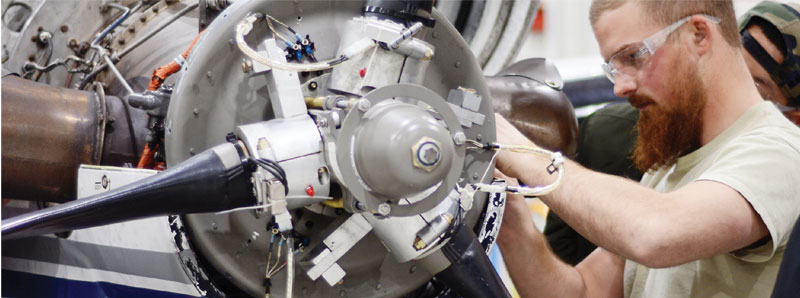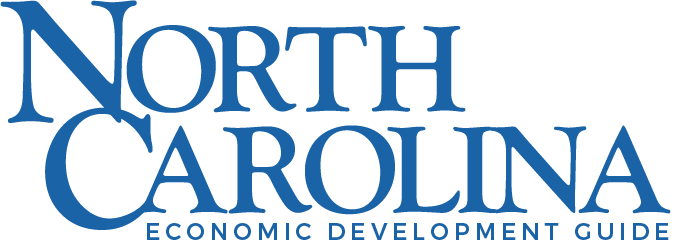Focus: Triad region, inside job
Logistics, location and labor have been key factors in the Triad’s economic success. Investments are ensuring continued growth throughout the Carolina Core.
—By Kathy Blake
The Triad is named for the geometric arrangement of its most populous cities — Greensboro, Winston-Salem and High Point. But there’s more to the 12-county region than its moniker. It’s home to three interstates with two more under construction.
More than 110,000 students are enrolled in Triad colleges, universities and technical schools. And its diverse economy includes aviation and aerospace, logistics, entrepreneurship and biotechnology sectors.
Adjoining the Triad is the Carolina Core, a 120-mile swath that starts west of Winston-Salem and continues toward Fayetteville, following the route of U.S. 421, which is the future Interstate 685. It boasts six industrial parks, including one at Piedmont Triad International Airport and two megasites. Thousands of shovel-ready acres are positioned so eventual tenants can take advantage of customizable workforce development, distribution routes and growing consumer markets.
Stan Kelly, who will be turning over the CEO reins of Greensboro-based Piedmont Triad Partnership to its president, Mike Fox, in May, says the Carolina Core brand launched three years ago. “We are working to further strengthen our region and market the physical assets of the Core as well as its sector strengths and talent advantages,” he says. “We are a region that has invested in itself. To date, the public and private sectors have invested hundreds of millions of dollars in infrastructure, building sites and higher education, which will support economic growth in the Carolina Core for years to come.”
Penny Whiteheart, the partnership’s executive vice president, calls Carolina Core’s momentum “the new economy” with regional supply chains, reshored manufacturing and a local industrial focus. “Stan [Kelly] has said time and again that our region believes in the notion that a win for one is a win for all,” she says. “A win for one community benefits not only that community but the surrounding region and the entire state. The Carolina Core’s economic momentum is fueled by its unique combination of assets, from megasites to Class A office space, from bustling metros to rural communities. Leaders from the Carolina Core are closely aligned with my administration and [the Economic Development Partnership of North Carolina]. We have worked together to recruit industry to the state, to support efforts to make [U.S.] 421 a future interstate and to support our higher education institutions, among other initiatives.”
PARK IT
Bob Leak is a more than 30-year veteran of economic booster Winston-Salem Business Inc., which joined forces with the Winston-Salem Chamber of Commerce to form Greater Winston-Salem Inc. in 2019. He was named Whitaker Park Development Authority president in March 2020. Though the past year has proved challenging with the COVID-19 pandemic and stay-at-home orders, he sailed forward, using marketing, videos and website updates to promote what he’d been coaxing from backstage for two years. “[It was] like trying to sell real estate from the upstairs bedroom,” he says. “We had projects that were underway, and we were able to host the occasional visitor, put our masks on and knock on wood.”
Winston-Salem-based tobacco company Reynolds American donated 220 acres for the park. “It’s an industrial area and has been since Reynolds developed it in the ‘60s,” Leak says. “Our goal is to re-energize this facility and this property into industrial and distribution and residential and hotel space and bring some vibrancy to the surrounding area.”
Whitaker Park is 2 miles north of downtown Winston-Salem and adjacent to Wake Forest University. It has rail access and is a half-hour drive from PTI. Using phrases such as “economic catalyst” and “banner year,” Leak doesn’t waiver on the park’s promise, which is already showing. Bloomington, Ind.-based Cook Medical, for example, will use an 850,000-square-foot former cigarette factory — at one time the world’s largest — to make medical devices. Its 650 Winston-Salem-based employees will work there, along with 50 more by 2030. The park’s original tenant, Raleigh-based Virtue Labs, has doubled its space for manufacturing hair products, and a mixed-use development that includes 300 apartments, a hotel and retail space was announced in 2019.
Leak says the past year has reaffirmed his belief in the park’s potential. “We have three projects under contract, and we closed on the residential in December [2019],” he says. “I think in five years, it will be the catalyst we anticipated it would be. When we got this park, it was all empty. We’re trying to recruit companies that will put a lot of people back to work, increase the tax base of the community, and support the Wake Forest [University] campus and the athletic campus: large-scale projects that will have an impact.”
Carolina Core’s growth is both organic and cultivated. “I think there’s no question [that] this is a new dynamic, but it’s not the only piece of the puzzle,” Leak says. “For instance, two projects we’re looking at right now are wanting to relocate because they’re looking at a better cost of operations, a better quality of life, access to highways and ports. So, we continue to have interest from out of the area. But there’s no question that future growth in the Triad will come from entrepreneurship and startups. You have to do some recruiting. To be successful, you have to take the holistic approach to make communities better.”
TAKING OFF
Carolina Core’s higher-education offerings include Jamestown-based Guilford Technical Community College. It’s a gateway to jobs at PTI, where aviation-related companies, such as aircraft refurbisher HAECO Americas and delivery company FedEx, have set up shop. Nick Yale, the college’s director of aviation programs, has worked in the aviation industry for 30 years, including stints as a technician, instructor, private pilot, airframe and power-plant technician, and avionics technician. “We have one goal, which is to offer successful programs where upon completion, students can and will be hired by local, regional or national aviation employers,” he says. “We have successful apprenticeships set up with multiple employers in the region, so students can be gaining real experience while they are in classes.”
Guilford Tech’s Aviation Campus at PTI includes three buildings. The T.H. Davis Aviation Center — also known as Aviation I — opened in 1989, was renovated in 2016, and houses a helicopter, eight aircraft and 20 training systems. Aviation II is a 60,000-square-foot building with seven classrooms and 14 specialty labs that serves about 100 students daily in avionics, Aviation Manufacturing Quick Careers Program, and sheet metal and composites, the modern materials that today’s aircrafts are made of. The Caesar Cone II Aviation Building — also called Aviation III — opened in 2014 on 20 acres and is home to the aviation management and career pilot programs.

Students gain hands-on experience in aviation manufacturing at Guilford Technical Community College.
Guilford Tech recently added an aerospace manufacturing technology course and has three specialist tracks. Yale says the continuing education department is growing, too, adding classes in nondestructive testing and composites. “We are working on additions for commercial drone licensing and utilization,” he says. “And we are also working on the expansion of drone training to support the survey industry and marry up our offerings with our civil-engineering program with a transfer degree to [North Carolina Agricultural and Technical State University].”
Jobs are waiting for graduates of Guilford Tech’s aviation program. “HAECO has created a new website — HAECOisHiring.com — to help educate and guide those interested in a career with HAECO, as well as a longstanding training partnership with Guilford Technical Community College,” HAECO Airframe Services President Bill Collins said in a release. “We are committed to creating a career path for people who want to grow into these jobs.”
Yale says HAECO’s growing demand for workers stems from contracts that kicked off last summer. But it’s not the only company that’s interested in Guilford Tech’s students, even before they’ve earned a degree. “GTCC has an apprenticeship with HAECO set up in aviation, and about 40 to 50 appren-tices are involved at one time,” he says. “HAECO is looking for more. We also are trying to expand our regional aviation business, specifically Signature TechnicAir, Textron[-owned] Cessna, Honda, DaVinci Aerospace and Sky Aircraft Maintenance. We are applying for grants to support this expansion [and] hope to add another 20 to 30 apprentices in fall 2021. Delta Airlines and Endeavor Air in Raleigh also are recruiting at the school.”

Honda Aircraft’s HondaJet Elite S, made in Greensboro, was one of the “Coolest Things Made in North Carolina” on the 2021 N.C. Chamber list.
SITES TO SEE
Kelly can list all the reasons that make the region attractive to businesses. But he’d rather have them do it. “Companies have cited the Carolina Core’s robust workforce, strategic location, vast transportation and logistics networks, readily available sites and excellent quality of life as reasons to invest in the Core,” he says. “From our companies to our people to our deep investments in our communities, the Core is defining itself as a future-ready region brimming with opportunity set to transform North Carolina.”
The Carolina Core’s strongest sector is advanced manufacturing. “That is where our history is and where we see our future,” Kelly says. Recent economic development proves his point, with Nestle Purina PetCare’s $450 million investment that will bring 300 jobs to Rockingham County and furniture-maker Prepac Manufacturing’s $27 million investment and 200 jobs in Guilford County.
Carolina Core is dotted with industrial sites, railway connections and colleges. “Related to manufacturing is our logistics and transportation infrastructure,” Kelly says. It’s a selling point. Atlanta-based fast-food chain Chick-fil-A, for example, is building a $52 million distribution center that will create 160 jobs in Mebane, and United Parcel Service, also based in Atlanta, is investing $316 million and adding nearly 600 jobs to its delivery efforts in Mebane, Graham and Greensboro.
Industrial site opportunities are available for almost any need. The largest can be handled at Carolina Core’s two megasites. The Greensboro-Randolph Megasite’s 1,825 acres is near interstates 40 and 85. And Chatham-Siler City Advanced Manufacturing Site’s 1,802 shovel-ready acres is about 50 miles from two international airports, Piedmont Triad and Raleigh-Durham International.
Smaller-scale expansions and startups will find 10- to 1,000-acre sites at Triangle Innovation Point, which is billed as a life-sciences and advanced-manufacturing industrial park. And PTI Aerospace Center has 1,000 acres ready for development and proximity to Guilford Tech’s workforce training and graduates.
INNOVATIONS AND MOTIVATIONS
Collaboration is charting Carolina Core’s course. “Public and private leadership … is highly engaged and aligned on a vision for the future,” Whiteheart says. “The very formation of the Core is a result of regional partners coalescing around the area’s competitive assets to tell a story. From Winston-Salem’s Innovation Quarter, one of the nation’s foremost urban research parks, to Greensboro’s [Steven] Tanger Center for the Performing Arts, to High Point’s downtown catalyst project … community leaders have rallied around transformational projects for the good of the entire region.”
Innovation Quarter is marketed as a “knowledge community” for its transformation of an industrial district into a mixed-use collection of 1,000 apartments and lofts, retail — coffee shops, salons, financial services and restaurants — 20 miles of greenway and office space for 90 companies. It was recognized in December 2020 as “Best Practice for Creating Integrated Places” by research group Global Institute on Innovation Districts, which estimates that more than 100 are emerging worldwide, mixing workers, businesses, extracurricular activities, and research and development.
Innovation Quarter has 28 acres of shovel-ready land for development, but it’s not the only place where Carolina Core’s entrepreneurial spirit thrives. Congdon Yards in High Point has studio units suited for startups and small businesses, and private office and full-floor suites. A common area, boardroom, coffee bar and courtyard foster collaborations. A former textile mill, The Gateway building in Greensboro offers build-to-suit offices for entrepreneurs. “The Core is undergoing multi-billion-dollar downtown transformations to revitalize and repurpose downtown cores into mixed-use and residential living space to breathe life into downtown centers,” Kelly says.
Part of that transformation comes from a COVID side effect: Many people are looking to relocate, escaping crowded urban centers to work remotely. “We believe that midsized cities are extremely attractive to people growing their career,” Kelly says. “In the Core, businesses and people can access North Carolina’s fast-growing metros while still benefiting from the perks and quality of life of midsize cities and small towns.”
Even as vaccinations put pandemic restrictions in the rearview mirror, Carolina Core will continue to drive ahead. “We look forward to continuing our work together to win new jobs and expansions in the Core,” Whiteheart says. “Together, we can secure a strong future for generations to come and ensure North Carolina is among the most prosperous and competitive states in America.”

